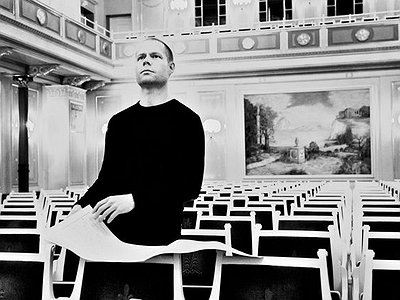Part 2: Something to talk about
How would you define the term “interpretation”? How important is it for you to closely work together with the artists performing your work?
That’s interesting. Interpretation is the meeting point between the text and the person. It’s what that person brings to it; their biography, their intentions, their technique, their way of thinking about music. When all of that encounters the text, out comes the interpretation.
I’ve worked for a long time with a fairly close-knit group of players who have become mind readers over the years and so I don’t really feel like we interpret my stuff. We just kind of play it. I deliberately leave the scores fairly blank. There are never loads of phrase or dynamics marks in my scores because I am actually quite interested in the people who are playing my music. I want them to really walk into the material and inhabit it in their own way.
So yes, interpretation is definitely important to my work.
The effect of a piece doesn't merely depend on the performance of the musicians, but also on the place it is performed at. How do you see the relationship between location and sound? In how far do you feel the current system of concert halls is still the right one for your music – or for contemporary music in general?
Concert Halls, in a way, are actually quite problematic because they bring with them all kinds of social baggage and rituals. In some ways they frame the space in that psychological moment for hearing music, but in other ways they’re also quite oppressive.
I’ve played in all kinds of settings from concert halls to clubs and everything in between but in recent years I’ve started to do more gallery space performances. What’s really interesting about these sorts of spaces is that people encounter the music in a different way. There seems to be more freedom in that sort of setting and it’s definitely something that I’m interested in exploring further in the future.
The role of the composer has always been subject to change. What's your view on the (e.g. political/social/creative) tasks of composers today and how do you try to meet these goals in your work?
Music is a social art, kind of like talking, but in a way, music as a vehicle for political critique has evaporated in the last 20 years and that’s disappointing.
I think if we’re talking about something in music, we should be talking about the big things that are worth talking about and those things are: the state of the world; how we live and how we spend our time. That’s something that really drives me.
For example, the track "The Shadow Journal" on Blue Notebooks, for me, is a protest song. It was composed and recorded the week after the first big anti-Iraq war march in London. And even though Czeslaw Milosz’s words are actually describing the Second World War, the imagery he used resonated with me at that particular moment in time and so social comment was most definitely the primary motivation behind this piece of music.
Generally speaking though, people are not thinking about music in those terms anymore, not if you compare it to the counter-culture movement of the sixties, when social commentary was one the absolute driving forces of music. It's a shame and a lost opportunity in many ways.
How, do you feel, could contemporary compositions reach the attention of a wider audience?
Good question. I don’t know really.
I guess one place people might hear music that they wouldn’t usually listen to is in the cinema funnily enough. Everyone goes to the cinema where they’re quite happy to sit and listen to all kinds of crazy dissonant, abstract music without thinking 'oh, I don’t really like that'. However, making that leap to people going to hear that sort of stuff in concert halls is another thing altogether.
The contemporary classical music world is kind of oddly conservative. It’s got its own little universe that doesn’t let people in very easily. That may be a bit of what’s off-putting for some folk. The other thing is that file sharing has come along and people listen a lot more widely than they would have previously.
Back in the days when you actually had to go and seek out a record and then pay for it, there was more incentive to get to know it deeply. Whereas now people have everything at their fingertips and are not so invested in getting something out of it.
Music-sharing sites and -blogs as well as a flood of releases in general are presenting both listeners and artists with challenging questions. What's your view on the value of music today? In what way does the abundance of music change our perception of it?
At the moment we’ve got a tsunami of material flying at us from all over the place and it’s not just music sharing. It’s actually the migration of many other parts of our culture onto the web and of course there’s an upside and a downside to this migration for music.
The upside is that people are now listening more widely. All sorts of people are starting to be heard who just wouldn’t have been heard before. In the past it was a straightforward situation of a record company basically saying yes or no. It was an A&R man’s decision as to who got heard and who did not, whereas now, everyone can just find their own way. I also think that the way live music has come back as a result of all this is great. People are actually playing again which is wonderful.
The flipside is that with the flood of material, it becomes harder to appreciate things. The pure quantity aspect overwhelms our sense of value. That said, I do believe that in the coming years we’ll work it all out somehow. New types of media will come along with new ways of hearing and distributing music, so it will evolve and eventually balance itself. I’m not too worried about it really.
Composers have traditionally found it hard to secure a living with their art. What are the financial realities you're living with and in which way, do you feel, could they be improved?
[Laughs] Well, it’s not a career that I would recommend to anyone. I think if you can possibly do something else, then go and do something else! You know, this question actually makes me think of that story about Leonard Cohen being a bit anxious about his financial prospects of living as a poet and deciding to become a composer [more laughing]. That is just so insane! Of course it worked out for him in the end, but it can be precarious.
Certainly now, when record sales have basically disappeared completely, and something like ninety percent of all music released is illegally downloaded, that way of making a living has just gone away so it’s really difficult. I think people just have to be very realistic about what they’re getting into and do music because they love doing music.
Usually, it is considered that it is the job of the composer to win over an audience. But listening is also an active, rather than just a passive process. How do you see the role of the listener in the musical communication process?
The listener is incredibly important because that’s who I’m talking to or trying to have a conversation with. I am really looking to move away from the situation that was around when I was studying, which was that kind of modernist thing where the composer was a towering genius that presents this text and you just had to try and understand it.
I’m trying to get towards a situation of give and take. That’s why I leave a lot space in the music that I write. I want my music to become a place for the listener to walk around in and find their own way around. For me, that’s what is important and hopefully that’s what people find the opportunity to do in my work.






